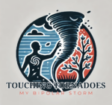It was the second day at an inpatient facility when I became certain the other patients were plotting to assault me and ultimately murder me. A couple of days earlier, I had been taken to the ER because I couldn’t bring myself to a place of calmness or clarity. I was a danger to myself. My mind was stuck in a relentless loop of failure, and I couldn’t see a way forward—a way where everyone wouldn’t be better off without me.
This was a new and terrifying experience. I had never felt this intense, nonstop sense of failure and worthlessness before. A voice inside me told me I didn’t matter, that I had screwed everything up, and that I was a burden. I was coming down from a year-long hypomanic phase, punctuated by a couple of periods of complete mania. I had recently been diagnosed with bipolar disorder and had only just begun to understand what those terms meant.
At this point, I had been prescribed several different medications and had been abruptly switched or pulled off others due to my reactions. Looking back, I’m unsure whether the thoughts I was having or the state I was in were entirely my own or if the medications were contributing to the confusion and mixed state I found myself in.
To say I wasn’t myself was an understatement. But because I was reeling from the whirlwind of transitioning from mania to depression—and grappling with the lifelong label of bipolar disorder—I wasn’t sure who I was anymore anyway. I was stuck reliving my manic moments, consumed by shame and guilt, knowing that my wild behavior didn’t reflect who I truly wanted to be. I had to remember every person I had come in contact with over the past year during those manic states.
By the time I was at the facility, I had wrapped myself so tightly within my own mind that I believed I was there to pay for my mistakes. In my mind, the reason I had been taken there was for retribution. I thought the patients were actors, pretending to be patients, all of whom had heard my story and been hired to make me pay for my sins. I believed the staff would turn a blind eye and allow the patients to have their way with me.
On the first night, I managed to survive, but on the second night, I froze. I was certain that if I fell asleep, the ex-military operatives posing as patients would dismember me as punishment. I stayed awake the entire night, sitting on the edge of my bed, terrified that any movement or rest would trigger their attack. I heard them murmuring through the halls, banging on walls, and whispering details of my manic episodes that only my family could have told them.
Panic consumed me as I rocked back and forth, convinced of my impending fate. The staff checked on me every 15 minutes, as they did for everyone, but I saw their check-ins as mockery. I believed they were reporting back to the others, orchestrating when to attack.
Finally, exhausted and desperate, I gave up. To find rest, I decided to accept my fate. I confessed. I repented. I told God everything I was remorseful for. I thought of every mistake, every regret, and every sin throughout my life. I prayed with all my heart for the fear to stop. I begged for peace.
And then, suddenly, the fear was gone.
I didn’t know in that moment if I had been forgiven or if I was simply ready to let the patients do what they wanted to me. But the thing that actually happened was far more profound: I was snapped back to reality. My hallucination ended. I saw everything as it truly was. The other patients weren’t actors; they were just patients. The staff wasn’t conspiring against me; they were there to help. There was no plot to harm me. Everything I had feared was a creation of my mind, but it had felt so real.
Before that night, I had been afraid to pray. During my manic phase, I had become deeply involved in religion, to the point of believing I was some sort of prophet. When I came crashing down into this mixed state, I wasn’t sure what to think about God or religion anymore. Yet, when I finally prayed and asked for the fear to stop, it did.
That night marked the beginning of a new relationship with God and with myself. It’s a relationship that is still confusing but has become more and more rewarding. Now, I have a connection with a higher power where I am not in charge, I am not in control, and I can ask for all the help I need without fear of judgment. The judgment was over. I had confessed, and I was ready to start discovering who I was and who I am meant to become.
In many ways, I felt saved. Even though I had endured a horrible experience and received a life-changing diagnosis, I knew I could step forward into the unknown. My path was just beginning and continues to evolve daily, but it is faith that keeps me determined to stay well. Faith that God has a plan. Faith that God has provided the right medication and therapy. Faith that there is a reason I had to go through this experience. I don’t know that reason yet, but I’m determined to make the best of it.
Like this:
Like Loading...

